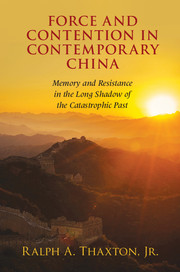 Force and Contention in Contemporary China
Force and Contention in Contemporary China Book contents
- Frontmatter
- Dedication
- Contents
- List of Illustrations
- Acknowledgments
- Cast of Characters for Da Fo Village and Several Other Villages in the Hebei-Shandong-Henan Border Area, 1945–2013
- Maps
- Introduction
- 1 The Violent Dawn of Reform
- 2 Contemporary Tax Resistance and the Memory of the Great Leap
- 3 Birth Planning and Popular Resistance
- 4 Rural Schools and the “Best Citizens of the State”: The Struggle for Knowledge and Empowerment in the Aftermath of the Great Leap
- 5 Official Corruption and Popular Contention in the Reform Era
- 6 The Rise of the Electricity Tigers: Monopoly, Corruption, and Memory
- 7 The Defeat of the Democratic Experiment and Its Consequences
- 8 Contentious Petitioners and the Revival of Mao-Era Repression
- 9 Migration and Contention in the Construction Sector
- 10 The Rise of the Martial Artists and the Two Faces of Mafia
- Conclusion: Big Questions and Small Answers from Da Fo
- Bibliography
- Index
- Miscellaneous Endmatter
Conclusion: Big Questions and Small Answers from Da Fo
Published online by Cambridge University Press: 05 August 2016
- Frontmatter
- Dedication
- Contents
- List of Illustrations
- Acknowledgments
- Cast of Characters for Da Fo Village and Several Other Villages in the Hebei-Shandong-Henan Border Area, 1945–2013
- Maps
- Introduction
- 1 The Violent Dawn of Reform
- 2 Contemporary Tax Resistance and the Memory of the Great Leap
- 3 Birth Planning and Popular Resistance
- 4 Rural Schools and the “Best Citizens of the State”: The Struggle for Knowledge and Empowerment in the Aftermath of the Great Leap
- 5 Official Corruption and Popular Contention in the Reform Era
- 6 The Rise of the Electricity Tigers: Monopoly, Corruption, and Memory
- 7 The Defeat of the Democratic Experiment and Its Consequences
- 8 Contentious Petitioners and the Revival of Mao-Era Repression
- 9 Migration and Contention in the Construction Sector
- 10 The Rise of the Martial Artists and the Two Faces of Mafia
- Conclusion: Big Questions and Small Answers from Da Fo
- Bibliography
- Index
- Miscellaneous Endmatter
Summary
A FISSURED LEGITIMACY
The story of Da Fo village, and its sister villages in this interior North China border area, sheds light on an important paradox of contemporary Chinese politics: the Communist Party–led Central government apparently has overall legitimacy nationally and yet hidden fissures in its legitimacy in the deep countryside. The case of Da Fo introduces us to political contention within one of these fissures. It tells us that we cannot grasp the genesis, or essence, of authoritarian China's unresolved legitimacy crisis without carefully studying the way in which memories of Chinese Communist Party (CCP)-inflicted suffering in the Mao era persist in the lives of rural people, providing the psychological and emotional bullet points that inform and direct defiance, resistance, and contention.
Many Da Fo survivors of the Great Leap–era famine remember it as the most traumatic episode of one-party dictatorship, retaining smoldering resentments of its horror. Reform-era Central government policies, and their local implementation, delivered new injustices, stoking fears of a repeat of past loss. Da Fo's inhabitants drew on memories of regime misconduct in the Mao period to protect themselves from the renewal of party-structured aggrandizement and lawlessness in the present. These memories of the traumatic past constitute what James C. Scott calls “weapons of the weak,” and villagers relied on these weapons to bolster their quest for survival in the present. Da Fo's history calls us to reflect on how this process factors into a type of grass-roots contention that is suppressed but not fully controlled by the Central government, nor by its political base in the villages, towns, and markets of the unknown interior – many of which were decimated, if not devastated, in the Leap famine and shortchanged by the post-Mao center.
THE FALSE PEACE OF REFORM AND THE ROLE OF EPISODIC MEMORY IN RESISTANCE
Bringing in the missing variable of episodic memory and studying the case of Da Fo, we can begin to grasp how memory of the Great Leap and its famine influenced resistance in the post-Mao period. The Deng Xiaoping–conceived reform sailed Da Fo's villagers into the headwinds of the Great Leap past, raising villagers’ fears of once again being caught in a rapidly evolving political storm in which the sky would collapse and the land and life itself would be turned upside down. The fears fed into resistance, ongoing or otherwise.
- Type
- Chapter
- Information
- Force and Contention in Contemporary ChinaMemory and Resistance in the Long Shadow of the Catastrophic Past, pp. 390 - 420Publisher: Cambridge University PressPrint publication year: 2016
